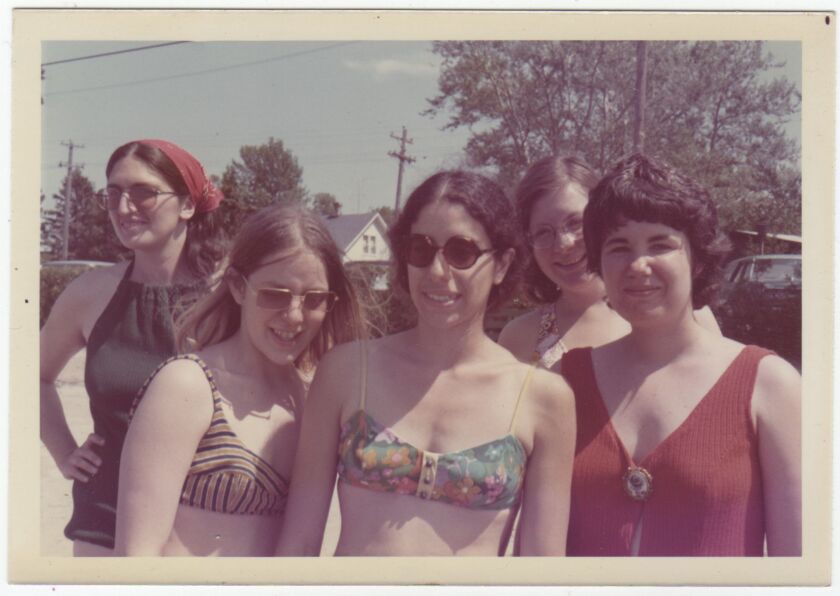In the Chicago and the Illinois and the United States of the late 1960s and early 1970s, a woman normally couldn’t get a credit card in her own name, pregnant women were rarely seen in the workplace, only married women had legal access to contraception — and it was against the law to have an abortion.
Recalling her experience with pregnancy in the late 1960s, a woman named Dorie Barron says, “I had no other options, I wanted it over with, I didn’t care how it was done. I was that desperate.” An acquaintance gave her a number of someone who was associated with the mob, and the woman was told she could have one of three levels of so-called care: a “Chevy” ($500), a “Cadillac” ($750) or a “Rolls-Royce” ($1,000). She was instructed to go to a seedy motel room in an unfamiliar part of town.
“They spoke all of three sentences to me the entire time: ‘Where’s the money,’ ‘Lie back and do as I tell you,’ ‘Get in the bathroom,’ that was it.” She and another young woman who had undergone the same procedure were “out in the middle of nowhere in a motel, bleeding.”
This story is told at the outset of “The Janes,” a searing and sobering and at times tragic but also inspirational documentary premiering Wednesday on HBO. Directors Tia Lessin and Emma Pildes do nomination-worthy work in telling the story of what women had to endure in the years immediately preceding Roe v. Wade — and how one group of smart, independent, determined, resourceful and brave women in Chicago created an underground network to facilitate illegal but safe abortions for literally thousands of individuals from 1968-1973. They called themselves “The Janes,” because that was a simple name, and it was considered kind of old-fashioned and outdated at the time, and that’s who you would ask for if you dialed the hotline for help.
Dorie Barron survived her harrowing abortion experience; many others didn’t make it or suffered serious injuries. As we see in archival footage and we’re told through interviews with a number of women who became involved with the Janes, there were so many back-alley or self-administered abortions during this period that Cook County Hospital had a 40-bed septic abortion ward, admitting some 5,000 cases a year. Particularly for women of lower socioeconomics, choosing to have an abortion meant not only breaking the law but endangering oneself.
This is where the gutsy, heroic and necessary Janes came in. They were a mostly white, well-educated and socially conscious group, many of whom had been involved with the civil rights and women’s rights movement in the politically charged atmosphere of the Chicago of the 1960s. It was “an outrageous undertaking by a lot of smart women,” recalls a Jane member.
Now in their 70s, a number of Jane members tell their stories with admirable candor, great heart and a dash of humor here and there. We hear of how the Janes took out ads in underground newspapers and posted fliers on bulletin boards around Chicago, saying, “Pregnant? Call Jane.” If you called the number, one of the Janes would get back to you and get your information, and record it on index cards, before guiding you through the process. (In present day, we see former Janes flipping through these tattered index cards, which indicate the age, the financial capabilities and other pertinent information about a prospective patient. No one was turned away; if you could pay only $4, you paid $4.)
We’re also introduced to “Mike,” who looks like he walked off the set of a Chicago-made sitcom and speaks in matter-of-fact tones about the countless safe abortions he performed — but he was not a doctor and claims he never told anyone he was a doctor, even though his code name was “Doctor Kaplan.” And we hear from a former Chicago homicide detective who talks about how his unit reluctantly had to investigate when a woman came into the station and said her sister-in-law was going to have an abortion and she wanted it stopped. “We were just the guys stuck with the law,” says the detective.
Seven of the Janes were arrested and charged with abortion and conspiracy to commit abortion and were facing serious prison time, and “The Janes” becomes something of a legal thriller in its final act, as the flamboyant and brilliant attorney Jo-Ann Wolfson kept filing motions to stall for time, effectively putting off the trial as Roe v. Wade worked its way through the courts. When the Supreme Court ruled an abortion was between a woman and her doctor, the case against the Janes disappeared. The group was dissipated, as it was no longer needed.
Cut to present day, and with the U.S. Supreme Court apparently on the verge of overturning Roe v. Wade, one can’t help but wonder if we’ll see a new generation of Jane-type collectives springing into action.






